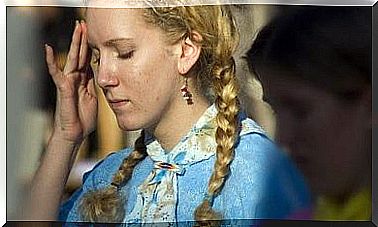Situations Where You Should Not Breastfeed

The World Health Organization (WHO) recommends that babies maintain a diet based on exclusive breastfeeding for at least six months of the child’s life. However, are there situations where you should not breastfeed? Sadly yes. Join us to discover them below.
7 situations in which you should not breastfeed

In general, a mother can breastfeed her baby even when she is sick, as long as it is not one of the illnesses we will describe below, that it is not fatal, and that she does not need drugs that can pass through the milk.
The Hospital Marina Alta in Dénia, Spain, has published a website with the compatibility of different usual medicines for minor illnesses (flu, angina, gastroenteritis, cystitis) with breastfeeding: e-lactancia.
However, what happens when the mother needs hospitalization or has a serious infection? Next, we will discover together the situations in which you should not breastfeed.
1. Human T cell leukemia
Human T-cell leukemia is caused by a retrovirus. After successfully infecting a cell, it uses an enzyme to convert its RNA into DNA, mixing with the host cell’s DNA and multiplying. This infection can be passed from mother to baby through breastfeeding.
2. HIV virus
It has been proven that the HIV virus passes through breast milk ; for this reason, it is recommended to stop breastfeeding when the mother is infected with the virus.
Currently, different ways to allow breastfeeding by mothers with the virus are being studied. There is still a lack of research on the action of retroviral drugs and the safety of the treatment.
3. Galactosemia: one of the situations in which one should not breastfeed
This disease is characterized by the child’s inability to digest galactose, one of the sugars that make up lactose and which is present in breast milk. It is a rare inherited disease that can damage a child’s liver and central nervous system.
There are three types of galactosemia, but diagnosis is extremely difficult. Although those with peripheral or intermediate galactosemia may consume certain levels of galactose, as the type of disease cannot be precisely determined, exclusion of galactose from the diet is often recommended, with cessation of breastfeeding.
4. You are pregnant and have a bleed

Another of the situations in which you should not breastfeed is if you are going through a risky pregnancy. If your pregnancy is not a risky one, doctors will surely tell you that breastfeeding does not need to be abandoned. However, when there is bleeding or the threat of premature birth, it is almost always advisable to stop breastfeeding.
5. Cytomegalovirus
Data on whether you can breastfeed if you are a cytomegalovirus carrier is controversial. Some studies indicate that the transmission of this virus through breast milk can cause serious harm to premature babies. However, so far there is no conclusive information on the subject.
Research indicates that freezing breast milk can help deactivate the virus and allow a child to feed safely. Consult your doctor to clarify your doubts on the subject.
6. Situations in which one should not breastfeed: medication consumption
The habitual ingestion of certain medications is considered incompatible with the maintenance of breastfeeding. This is the case of those who take anxiolytics, antiretrovirals, medication for migraines or sleeping pills. The same is true with chemotherapy.
7. Addictions
Alcohol and drug addiction are two situations in which you should not breastfeed. In fact, it is advisable to stop consuming these substances even before becoming pregnant.
Diseases that do not prevent breastfeeding

Other than those mentioned above, other illnesses do not necessarily prevent breastfeeding, unless there is a medical contraindication. Check with your doctor if you have any of the following illnesses:
- Hepatitis: Hepatitis B and C viruses are not transmitted in breast milk. In the first case, when the mother is a carrier, the newborn usually receives the vaccine against the disease and specific immunoglobulin to prevent its spread.
- Chagas disease: data are inconclusive, but the latest WHO studies indicate that breastfeeding should not be discontinued.
- Mastitis: Inflammation of the mammary gland is quite common in nursing mothers. Breastfeeding must not be stopped; in fact, the baby’s suckling helps alleviate discomfort.
- Tuberculosis: according to data from the Spanish Association of Pediatrics, breastfeeding would not be contraindicated in this case.
- Chickenpox: Doctors often suggest that breastfeeding be continued and that the newborn be monitored. It is possible to give the baby anti varicella immunoglobulin.
- Breast operation: if you had breast surgery, either to enlarge or reduce them, you can breastfeed without problems. Obviously, milk production can vary from one woman to another.
Asthma, allergies, hiccups and hyperthyroidism are also not diseases that prevent you from continuing to breastfeed. As we always say, consult your doctor to find out more about your specific situation. No one can advise you better than him.









